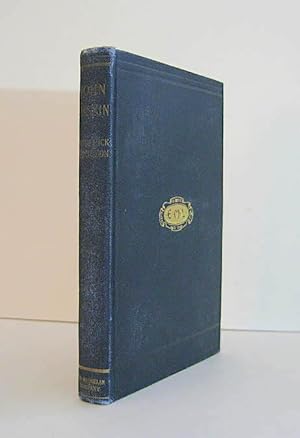Descripción
John Ruskin was a giant of critical exposition - he was one of the accepted arbiters of taste in the Victorian era, and his essays and books among the most widely-read in the world of English letters. In this charming book, issued in Macmillan's "English Men of Letters Series", Frederic Harrison offered up a combination biography and critical evaluation that serves well as an introduction to the work, life and thought of John Ruskin. It is not a full-blown biography, nor does it shock the reader with unwonted speculations and nor does it have a critical axe to grind. It is straightforward and to the point. That being said, Harrison is good at displaying the numerous meaty nuggets to be found in his subject, but it is also obvious that he was much admiring of Ruskin, and while the book doesn't quite approach hagiographical status, it is a well-intended laudatory effort. ****************** Here is a brief excerpt, just to give a flavor: There is much fine moral and social edification in the book too! (he is speaking of The Stones of Venice ) All that he tells us how the life and work of the actual worker is after all the essence of Art; the scorn that he pours on the pitiful tricks of imitating the grain of fine wood and marble on plaster and deal boards; the meaning of 'education' as distinct from the cramming in of information; the teaching as to true and false ornament, as to the variety in ornament, as to the dignity of pure color - this and a thousand other suggestions make it , as Carlyle truly said, 'a sermon on stones'. **************** In the sixth chapter of the second volume is a passage about the mental slavery of modern workmen which may be said to be the creed, if not the origin, of a new industrial school of thought. It is as powerful in expression as it is elevated in conception. Men may be beaten, chained, tormented, yoked like cattle, slaughtered like summer flies, and yet remain in one sense, and the best sense, free. But to smother their souls within them, to blight and hew into rotting pollards the suckling branches of their human intelligence, to make the flesh and skin, which after the worm's work on it, is to see god, into leathern thongs to yoke machinery with, - this is to be slave-master indeed; and there might be more freedom in England, though her feudal lord's lightest words were worth men's lives, and though the blood of the vexed husbandman dropped in the furrows of her fields, then there is while the animation of her multitudes is sent like fuel to feed the factory smoke, and the strength of them is given daily to be wasted into the fineness of a web, or racked into the exactness of a line . ***************** From Wikipedia : As a religious teacher, literary critic, historian and jurist, Harrison took a prominent part in the life of his time, and his writings, though often violently controversial on political, religious and social subjects, and in their judgment and historical perspective characterized by a modern Radical point of view, are those of an accomplished scholar, and of one whose wide knowledge of literature was combined with independence of thought and admirable vigour of style. ****************** And so, we can see why Mr. Harrison would wish to write about Ruskin, and maybe you can see why one might want to read Harrison's words about Ruskin's words. I warrant there's a good read in this book. ****************** SERIES: English Men of Letters. / TITLE : John Ruskin. / AUTHOR : Frederic Harrison. / PUBLISHER: Macmillan Company. / PLACE: New York. / DATE: February 1903. / EDITION : 2nd U. S. Printing. / STATUS : OP - Out of Print. / PHYSICAL DESCRIPTION : Trade Hardcover; contains an index; vi +[ii] + 216 pages; approximately 4 7/8" x 7 1/4"; dark blue rasp-textured cloth with tile, etc stamped in gilt on spine; publisher's series device stamped in gilt in center of front board; boards, front and rear, have simple line embellishments stamped in blind at top and bottom. top edge gilt; N° de ref. del artículo 488
Contactar al vendedor
Denunciar este artículo
![]()


